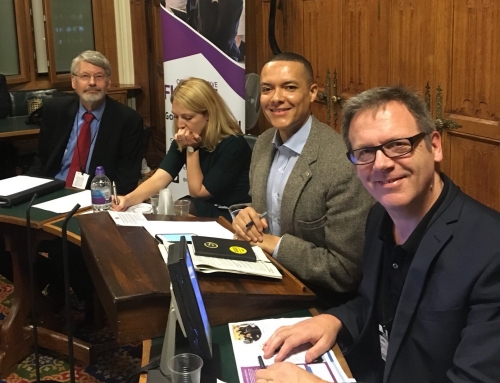We meet at a time of profound change in our education system, possibly the greatest change since 1944. It has been called Michael Gove’s ‘quiet revolution’, partly in comparison to the protests there has been at NHS reform. I am not sure it is quiet any more. .. not when one reads that Gove was booed at a recent school prom in the Royal Albert Hall!
But I am not that surprised. I have been going round the country talking about my book “School Wars: The Battle for Britain’s Education” which tells the story of 1944 to today, and argues for a very different kind of system to the one we seem to be heading towards.
Some findings about the current political mood
- people really want to understand how we got to where we are and what is happening now,
- they feel deeply uneasy, particularly about free schools – instinctively, they don’t trust them – and they are right not to – research this week from the blogger School Duggery confirms that they take far fewer poor children than neighbouring schools.
- many parents resent the ruthless and undemocratic pace of change, as maintained schools convert to academies,
- they deeply dislike the creeping privatisation of an essential public service, for all its historic faults and fault lines,
- and many are fearful of growing segregation in our system.
So where do we stand in terms of creating a comprehensive future?
Well, it’s not all grim. When I was researching School Wars, I quickly saw that there had been a profound and largely positive shift in the public rhetoric around education.
You could call it the vindication or even the triumph of the comprehensive principle. What do I mean by this? Well, you will not hear a mainstream politician stand up and argue for the return of the eleven plus or that we should divide our children at 11. Indeed Coalition politicians and their allies are very keen to stress non selective, all ability schools.
This is not just cynicism, or evasion, on their part, although there is much of that. It’s also a recognition of some hard won truths:
- the memory of the unpopularity of the eleven plus and secondary moderns, a discontent that proved the original motor for comprehensive reform,
- an acknowledgement of the success of many comprehensives – even if they are academies such as Mossbourne,
- an acute awareness of the methods and means of those nations that beat us in the global testing stakes: Finland; Alberta, a province in Canada; Shanghai. All come near the top of the PISA tests. All have non selective systems.
One of Gove’s favourite international figures, OECD head, Andreas Schleicher has unequivocally stated that the best education systems in the world are non selective.
BUT this apparent conversion to non selective all ability schooling co exists with a deeply English endorsement of existing selection. Only now it is called parental choice, and this, too, is endorsed at every turn, including it has to be said by many in the Labour Party.
So where will this lead us?
The future schools landscape looks complex and confusing.
But by the time, I had finished my book this Summer, it seemed to me that we are heading for a recreation of the tripartite landscape of 1944 only this time it will be shaped by the market and the language of parental choice, not the state.
There will be no overt talk of the return of eleven plus, or secondary moderns, with all the manifest injustices and class bias inherent in these old terms. No, the names will change but the ideas will be the same. We will start to hear instead, as one heard in a recent House of Commons debate on the grammars, largely attended by Tory supporters of selection, of ‘a different type of education for different types of children.’ Ex Tory minister Michael Portillo was unusually frank the other day when he said the failure of 1944 was that the secondary moderns weren’t good enough. Is this the new plan?
How is this being done?
There has been much opposition to Coalition plans for, and obsession with, academies and free schools. In particular there is opposition to the growth of academy chains that will replace local authorities, without public accountability.
We should oppose these changes, for many reasons.
- academies and free schools create a new layer of competition and an unfair playing field at the local level, in the dubious name of choice,
- local authorities, and many good comprehensive schools, are being dangerously ignored or run down,
- and the policy is centralising and undemocratic.
But I don’t think consideration of academies and free schools alone help us to an understanding of the new landscape. In fact, the key to this is the question of admissions, which goes to the heart of the work of Comprehensive Future and which applies to all schools.
In general, there is a pincer movement at work:
- on one hand, the government is vastly increasing the number of schools that are their own admissions authority,
- on the other, it is weakening the role of those bodies that scrutinise fair admissions, from locally based admissions forums to the role the School Adjudicator.
All of these changes are paving the way for the re-confirmation of some very old divisions.
- No more selection they say? Well, we are going to see expansion of existing grammar school places. The idea of a grammar school in every town will be aided by new admissions freedoms or a continuation of other forms of selection, like social selection. This means that some kinds of schools – church schools or conversion academies or free schools – will become de facto grammar schools. Bristol Free School, for example, has been allowed to draw up its own catchment area and so shape for itself a socially and economically favoured pupil population.
- The new technical schools will encourage many children, desperate for work, to go down that route at the age of 14 and so have their intellectual lives, in effect, shaped by business imperatives.
- And the new secondary moderns? Well, these may well turn out to be some of the non selective, all ability schools that Gove and Cameron rave about. They won’t select, but the middle class and affluent won’t apply for them for they will have found their peer group in the de facto grammar school.
We will see these ‘ non selective’ schools grow, particularly in the poorer parts of our big cities or in those areas where selective options lure away the better off. Some will be academies; better resourced than local maintained schools, and perhaps run on strict discipline; some will be run down maintained schools which fail to win a social mix; and some will be church schools but not the kind that everyone prays to get into.
Thoughts for the future
This seems a rather grim picture. However, I want to end on a positive note.
Going round the country, people want to do something. But what? ‘Save our schools’ isn’t quite the right campaign note in part because the Coalition is re-making our system rather than actively destroying our schools; that is the inherent, subtle danger of this policy.
The idea of a return to an old never fully implemented comprehensive dream doesn’t quite set out what needs to be done either.
What people want is a modern vision that differs from the Coalition dreary, class ridden, traditionalist vision, and a practical road map in terms of how to achieve it.
Some are looking to the new post Labour Labour Party to articulate different arguments, but not hearing them.
So, perhaps to encourage the Labour Party, we have to keep making the bigger arguments.
For all the grammar school back slapping currently going on, we have to keep pointing out that selection inevitably reinforces class inequalities and unfairness. It can’t be justified and it needs to be phased out.
We must never stop emphasising that academic excellence can exist within a comprehensive framework. We know from looking at other countries that a non selective system can work, with the right resources and framework.
As for the means, let’s not let the right steal our clothes either. We need to argue for smaller classes, a challenging broad curriculum, calm classrooms and schools that mix the academic and vocational.
We need to argue for schools that are genuinely accountable to parents and teachers and the public, not ones handed over to profit seeking shareholders or religiously motivated educational chains.
This is a potentially hugely popular platform for anyone who wants to fight on it!
So The School Wars are still ongoing: We have won a great deal already – let’s not forget that. And we can win a great deal more. The important thing is not to lose hope or heart, even in apparently dark times.
Melissa Benn’s book School Wars, the Battle for Britain’s Education is published by Verso Books.


